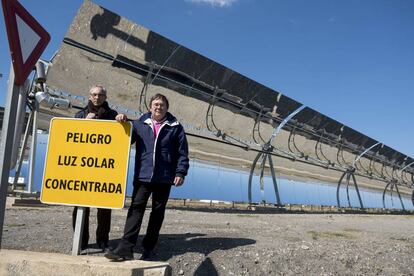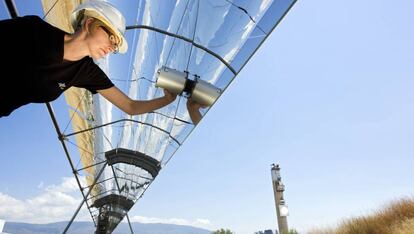Spain’s biggest renewable energy center languishing under fund freeze
Despite big budget, restrictions have triggered firings and shutdowns at the state-of-the-art Almería Solar Platform


The biggest R&D center for renewable energy in Spain currently finds itself in Kafkaesque circumstances. Although it has millions of euros in EU grants to spend, it is unable to do so due to spending restrictions imposed by the Spanish government in 2016, which are bringing what is considered a strategic center for the EU to its knees.
Almería’s Solar Platform (PSA) was set up in the 1970s in the Tabernas desert, just a few miles from where so many Spaghetti Western films were shot. Nowadays, it is the biggest research center for solar thermal energy in Europe. “Spain has installed the equivalent of two nuclear power stations in solar thermal energy plants,” says Sixto Malato, a researcher at PSA. “If it occupied 1.5% of the world’s deserts, we could generate enough electricity for the entire planet.”
These facilities have produced some of the technology used by major power plants currently in operation or under construction in the US, China and North Africa. And EU researchers routinely travel here to try out new technologies aimed at making solar thermal energy increasingly efficient and competitive, in an effort to reduce the use of fossil fuels.
Our problem is due to the state of science in Spain and the scarcity of work opportunities for highly trained people Laid-off worker from the plant
Approximately €6 million in funding is on hold due to a ruling pushed through by the Treasury department to limit expenditure, said Malato. The latest of these restrictions, approved in January, prevents public research agencies (OPI) from spending more than 50% of their allocated funds until the 2018 national budget gets approved. The governing Popular Party (PP) does not count on a majority in Spain’s lower house, Congress, and has failed so far to muster support from other parties to pass its spending plans.
The embargo on these funds means that 14 researchers – representing 35% of the team members with research experience – have been laid off. Last November Malato resigned as PSA director in a bid to force the government to lift the restrictions, but so far he has met with no success.
The researchers who have lost their jobs prefer to remain anonymous for fear of reprisals. Seated at a café not far from the center, five of them recently explained the situation. All of them are university graduates and some hold PhDs. Most are over 40 years old and have spent years working at PSA, always on temporary contracts. One woman, who holds a doctorate and has several children, was laid off at the end of December, after having worked at the plant for 15 years.

“Our problem is due to the state of science in Spain and the scarcity of work opportunities for highly trained people,” she explains. “I used to get the best grades in my class, and now my employment prospects are the most unstable. At 46, we have the same problems as a 26-year-old.”
The restrictions mean months of delays on projects that involve a number of European countries. One example is Waterspoutt, which has a grant of €3.5 million to develop technology to purify water in Uganda, South Africa, Ethiopia and Malawi. “The person responsible for this project at the PSA is one of us – laid off in February 15 and with no indication of when they will be taken on again,” says Isabel Oller, head of the Water Treatment Research Unit.
These days, the swathes of solar receptors from the direct steam generation systems are face down. This experimental installation, which is one of the platform’s “most emblematic”, has been out of action for four months due to a lack of spare parts that they are blocked from purchasing, says Eduardo Zarza, a researcher at PSA since 1985. Red tape also prevents installments of even just hundreds of euros being paid to international suppliers.
One experimental installation, the platform’s “most emblematic,” has been out of action for four months
“A large part of our income doesn’t come from the national budget,” Zarza explains. “It comes from the European Commission and what we’re asking is to be able to manage it on a multi-annual basis, not an annual one as we are being forced to do. It’s like being sent to war without weapons.”
The PSA has an annual budget of approximately €6 million, half of which comes from European projects. The center reports to the Center for Energy, Environment and Technological Research (CIEMAT) where there are approximately €70 million affected by similar financial problems, according to Malato. “If they don’t lift these restrictions, in one or two years we will have to start giving back the money that came from Europe,” he says.
In a letter sent in late February that EL PAÍS has seen, the president of Estela, the European Solar Thermal Electricity Association, asked the Spanish economy minister at the time, Luis de Guindos, for “the government to act firmly” to guarantee that the PSA will “regain its efficiency in project management and its level of excellence in innovation.”
A spokesman for the Economy Ministry recognizes the problems that the platform, CIEMAT and the rest of the public research agencies have been dealing with. “We have asked the Treasury department if they can exempt 15 contracts from the ruling, but we don’t know yet when this will be formalized,” he says. “The fact that we don’t have a national budget for 2018 doesn’t help.”
English version by Heather Galloway.
Tu suscripción se está usando en otro dispositivo
¿Quieres añadir otro usuario a tu suscripción?
Si continúas leyendo en este dispositivo, no se podrá leer en el otro.
FlechaTu suscripción se está usando en otro dispositivo y solo puedes acceder a EL PAÍS desde un dispositivo a la vez.
Si quieres compartir tu cuenta, cambia tu suscripción a la modalidad Premium, así podrás añadir otro usuario. Cada uno accederá con su propia cuenta de email, lo que os permitirá personalizar vuestra experiencia en EL PAÍS.
¿Tienes una suscripción de empresa? Accede aquí para contratar más cuentas.
En el caso de no saber quién está usando tu cuenta, te recomendamos cambiar tu contraseña aquí.
Si decides continuar compartiendo tu cuenta, este mensaje se mostrará en tu dispositivo y en el de la otra persona que está usando tu cuenta de forma indefinida, afectando a tu experiencia de lectura. Puedes consultar aquí los términos y condiciones de la suscripción digital.








































